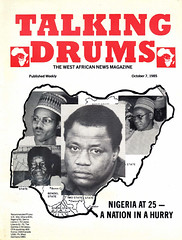Comment
A Nation In A Hurry
In twenty-five years, it is the very concept of nationhood that has come very close to breaking many times, but survived, Nigeria has and in many ways more wholesomely than could have been imagined at independence. The idea of being a 'Nigerian' rather than a Yoruba or Hausa or whatever else of the reputed 250 identifiable groups said to exist in the country becomes more acceptable.
It might very well be that the many difficulties that have faced Nigeria these twenty-five years have more than anything else, served as the unifying factor. Perversely, it was the arrival of oil wealth that has created even greater problems. It has proved so much more difficult to deal with wealth, for if there is one unifying factor among all Nigerians, it is impatience.
When the oil money was pouring in, everything had to be done immediately and at the same time and led to the creation of institutionalised chaos.
The image is that of choked full harbours and enough cement ordered within a three month period which could not be handled by all West African harbours in a year. Or the hopefully apocryphal story that made the headlines recently - the three times overbooked Nigeria Airways flight and the totally unorthodox measures adopted by a desperate soldier at Murtala Airport who ordered all the would-be passengers to race around the aircraft twice and the winners got the seats as they crossed the line! Outrageous and incomprehensible to foreigners but therein lies the seeds of dynamism and destruction within Nigeria.
When it comes to the individual scale, the handling of the wealth has been even more spectacular and the impatience of the Nigerian very much in evidence. It is not the reputed extravagance and high-profile life-styles that became associated with the 'rich Nigerian' that did the damage. Stories about Nigerian businessmen leaving half a million pounds in phone boxes and practically putting up house prices just for the sake of one-upmanship on their neighbours gave outsiders the impression that profligacy was a characteristic Nigerians could not discard.
The tales of all-night pink champagne parties and the spraying of 'Naira' will persist and to many people, that image is the true Nigeria and the Nigeria of scarcities, shortages, queues, high prices, is an aberration. Why else is it that the officially imposed 'austerity' of the past four years still needs to be regularly announced. People want to be rich, they all want to be very rich and at the same time. Some of the greatest emotions have been on display because everybody wants to be transformed overnight
This has generated more animosity and hatred than can be good for any country leading to the situation where so much energy is spent on petty rivalries and jealousies than on the traditional Nigerian values of resourcefulness and praise of success.
Many people seem to think that the salvation of Nigeria lies in a deliberate policy of people "unlearning" the notion of Nigeria being a rich country and adjusting to the notion of being poor.
But that is a notion that will take much more than another 25 years for Nigerians to accept and it is doubtful that such a state of affairs will help the country. It is the positive thinking of the Nigerian that has pulled the country through its many difficulties and it is positive thinking that will make Nigeria realise all her great promises.
It is particularly a lucky coincidence that at 25, the new order in Nigeria is laying emphasis on reconciliation and has repudiated the politics of hatred and divisiveness. For, the problems that confront the nation cannot withstand the pressures of energies and resources being wasted on "enemies within".
The enemies of Nigeria are those who would not work hard and would debase the laws of the country and would stifle the natural dynamism of the people.
The President, Major-General Babangida struck the correct chord in his anniversary speech when promised active citizen participation in decision making and a say in the governance of the nation. It is only while the majority of the people are convinced that they have stake and make their contributions out of that conviction can the nation move.
The great promise that was held out at independence was for a nation in which merit will be adequately rewarded, talent encouraged, the handicapped protected and room created to accommodate the diverse views and peoples that make up Nigeria.
Today that promise remains only that, but it has been for want of trying and there is every indication that it will be realised.
But when one considers all the terrible things that could possibly have happened to Nigeria, the very real possibility that the country might very well not have survived at all as an entity, it has to be said that the nation has done much better than could have been imagined. Even though things look bleak now, all things considered, Nigerians have a lot to be proud about and deserve hearty praise.
